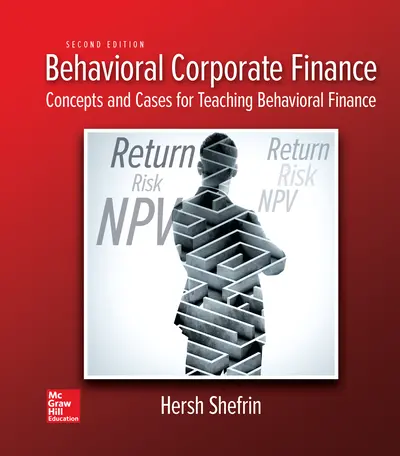Hersh Shefrin
Hersh Shefrin, who holds the Mario L. Belotti Chair in the Department of Finance at the Leavey School of Business, is one of the pioneers of behavioral finance. He has published widely in the area and writes for both academics and practitioners. Professor Shefrin regularly teaches behavioral finance courses and often speaks on the subject to financial executives, portfolio managers, security analysts, risk managers, and financial planners both in the U.S. and abroad.
In 1999, his book, Beyond Greed and Fear: Understanding Behavioral Finance and the Psychology of Investing, was published by Harvard Business School Press. This is the first comprehensive treatment of behavioral finance written specifically for practitioners. In 2002, Oxford University Press, who assumed publication of the book, released an edition with a revised preface to reflect recent events and developments.
In 2001, Professor Shefrin edited a three-volume collection, entitled Behavioral Finance, published by Edward Elgar. In addition to seminal papers in this rapidly developing field, these volumes contain some of the pioneering works in psychology,
upon which behavioral finance is based.
In 2005, his book, A Behavioral Approach to Asset Pricing, was published by Elsevier. This is the first book to develop behavioral pricing kernel theory, thereby providing a unified, comprehensive behavioral approach to the main elements of asset pricing theory: stochastic discount factor, mean-variance portfolios, beta, option pricing, and the term structure of interest rates. A second edition of this book was published in 2008.
In 2008, after the publication of the first edition of this book, Professor Shefrin published a related book titled Ending the Management Illusion, which described how behavioral corporate finance could be taught using a simulation game. The gaming approach places students in a decision environment in which both their intellects and emotions are engaged. Students work together in groups, making decisions to run a simulated company, in a setting that provides them with an opportunity to identify their own psychological tendencies, the tendencies of others, and to develop processes and group cultures that mitigate their vulnerability to behavioral pitfalls.
In 2010, Professor Shefrin published a monograph titled Behavioralizing Finance. The monograph discusses both the strengths and weaknesses to the behavioral approach, and suggests some directions for strengthening the weaknesses. In 2016, Professor Shefrin published a book titled Behavioral Risk Management. As the title suggests, the book describes the applicability of behavioral concepts to risk management, suggesting that risk managers augment their quantitative skill sets to include psychological elements. Risk management is a very broad area, as most corporate finance textbooks make clear, and applies to corporate finance. Professor Shefrin’s scholarly articles have appeared in the Journal of Finance, the Journal of Financial Economics, the Review of Financial Studies, the Journal of Financial and Quantitative Analysis, Financial Management, the Financial Analysts Journal, the Journal of Portfolio Management, and the Journal of Economic Behavior & Organization.
Professor Shefrin completed his PhD at the London School of Economics in the economics of uncertainty; he earned a Master of Mathematics from the University of Waterloo and a BS (Honours) in economics and mathematics from the University of Manitoba. He also holds an honorary doctorate from the University of Oulu, Finland.

